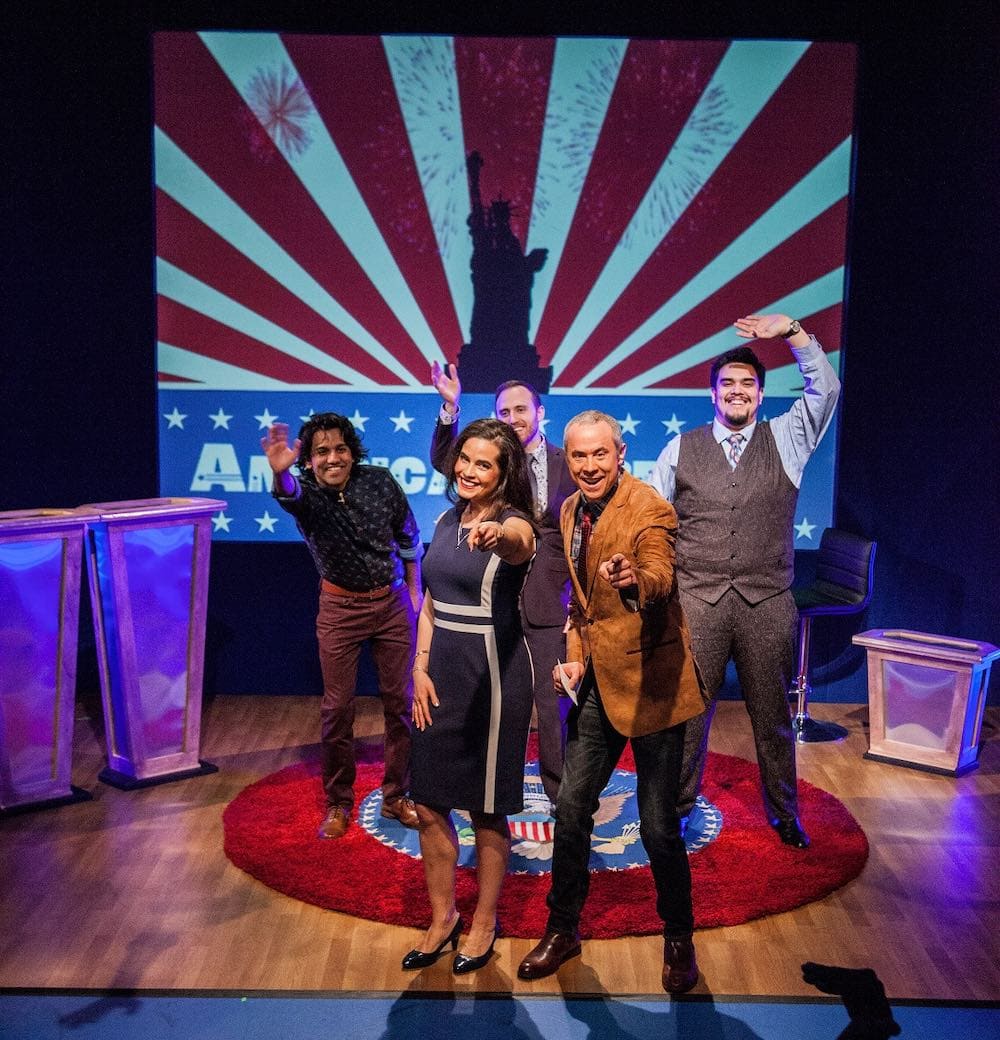“Every form of refuge has its price,” once sang The Eagles. That concept hasn’t changed as the ardent, emotion-packed American Dreams unfolds before audiences. American Dreams is Round House Theatre’s new live interactive Zoom offering produced in partnership with Working Theater and other national partners.
American Dreams explores the steep price that some are willing to pay to become American citizens. It is a production that is timely, political, and on-point as it wends its way to its emotion-packed concluding scenes.

What’s more, the viewing audience is a key part of the inspired concept. Willing audience members are asked to be far from passive, unseen onlookers. By being part of the production, the audience’s own values are also quizzed as they help decide who gets to come to America if there is room for only one more new immigrant. American Dreams was created by Leila Buck and Tamilla Woodard, written by Leila Buck, and confidently directed by Tamilla Woodard. Originally American Dreams was a live production, but with COVID-19 was changed into a very worthy digital production.
The premise of American Dreams is that three immigrants are seeking U.S. citizenship. They are in the final steps of being vetted for American citizenship by American authorities in the guise of two initially all-happy-talk but in time formidable bureaucrats. The two convincingly become all straight talking, powerful U.S. authorities portrayed by Leila Buck as “Sherry” and Jens Rasmussen as “Chris.”
In American Dreams, three individuals are taking part in a special government-sponsored game show as their last hurdle to citizenship. Each is taking part in the game show remotely from their home country. Each “contestant” is attempting to show why they should be permitted entry into the United States as they participate with the fictional American authorities and the real online audience who together become “the people who chose the people.”
And there is this: according to the play’s U.S. game show hosts, there is space for only one of the three potential citizens. The arc of the game show becomes an avid competition moving from humor to drama for the one available slot as the competitors respond to questions about “how America works,” or “America’s Favorites,” and then into rougher, more personal and way more political questions as each lays bare their thinking about the world, their faith, and America, as they think it must be. The heat of the production rises into a taut psychological drama (others may take American Dreams as a Jonathan Swift–type satire).

Who are the three would-be American citizens and where are they from? They are from Mexico (Andrew Aaron Valdez as “Alejandro”), Pakistan (Imran Sheikh as ”Usman”), and from Bethlehem, the Palestinian town in the West Bank (Ali Andre Ali as “Adil”). The fictional Alejandro is a former medic in the U.S. military now living in Mexico, Usman is a well-regarded illustrator in his home country, and Adil is a chef and restaurant owner. Each is portrayed with sincerity and a friendly, keen eagerness to please the U.S. authorities and the viewing audience.
All along the generally well-paced 90-minute arc of the Zoom production, willing viewers become intimately involved in the decision-making process of what becomes a drawn-taut drama as lightness and humor disappear. Viewers are asked to be seen and heard. The Zoom audience becomes a community providing their own opinions through online voting, or a raising of hands. The audience members help make the final American Dreams decision about who “wins” American citizenship.
Do know that each engaging American Dreams performance is live. With a different audience the final decision that I witnessed can be different from the one you might see.
Let me add kudos to the American Dreams Zoom creative team. Together they brought out the rising tensions of the play’s premise and the individuality of the characters though the video design of Katherine Freer, scenic design of Ryan T. Patterson, sound design from Sam Kusnetz, lighting design of Stacey Derosier, and the visually individualized costume design of Kerry McCarthy. The Zoom audience is well guided through the intricacies of online participation by a stage manager–like India Nicole Burton. I must write too that at times the Zoom structure can make the “heat” of American Dreams dissipate quickly, and one scene about cooking feels long. And there is this: those seeking U.S. citizenship all appear to identify as male.
If you are searching for compelling political theater that is not a mere screed against a sitting, at-the-moment, president and if you want to venture to know a bit more about your own inner values, take in American Dreams at Round House. It is in the DVM area for a short run before moving on to its next venue.
As I viewed and participated in American Dreams, I certainly asked myself if I were an immigrant or refugee and fervently wanted to come to America (as my grandparents once did), what would I be willing to say and do to become a U.S. citizen?
After you become tangled up in American Dreams, please do let me know your thoughts, please. As the production concludes, a contemporary version of Woody Guthrie’s “This Land Is Your Land” is heard, leaving one to wonder: is America the land made for you and me?
Running time: About 90 minutes with no intermission.
Round House Theatre’s live Zoom production of American Dreams streams through Sunday, October 11, 2020. Purchase tickets online.
Note from Round House Theatre: For optimal viewing and participatory experience of American Dreams, we strongly recommend using a computer rather than a phone or tablet. Active articipation is invited but not required. On the night of one’s ticket, once you click the access link, a patron will be directed to an online form first. Fill that out. This is the beginning of the show. The results of that information become part of the overall production.





